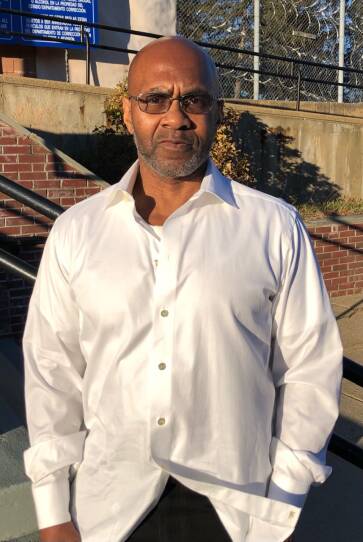Updated 5:20 p.m. Nov. 24
A Suffolk County Superior Court judge ruled Tuesday to vacate the 1974 rape conviction of a Massachusetts man, months after the victim of the attack told GBH News in an exclusive interview that she may have identified the wrong person. Tyrone Clark, who is Black, was 18 years old when he was charged for the rape, assault and kidnapping of Anne Kane, who is white. He was sentenced to life in prison for the rape count.
Judge Christine Roach said in the order that she would allow a motion for a new trial, and that the conviction on the rape count is vacated. Clark, now 66, has long insisted he was wrongfully convicted, and put forward a new motion this year to reopen his case, alleging the commonwealth failed to preserve key evidence, like biological specimens from the victim.
“Absent record evidence suggesting otherwise, the police, and by the extension the prosecution, acquired a duty of preservation once the material was obtained by the hospital. The record is devoid of evidence that the Boston Police Department met that duty,” the judge wrote.
Clark’s attorney, Jeffrey Harris, said his client was thrilled when they spoke late last night. “He’s been waiting for 50 years for the court to agree his trial wasn’t fair," Harris said. "And now the court agrees. This is a great day for justice.”
Suffolk County District Attorney Rachael Rollins filed paperwork with the court on Wednesday morning saying she would not prosecute Clark's case further since Roach agreed to vacate the rape conviction on the basis of faulty evidence.
"When we began looking further into the case, we learned that nearly half a century ago, the commonwealth lost or destroyed evidence that had the potential to be exculpatory," said Rollins via emailed statement. She said Clark was denied the opportunity of modern forensic testing "due the failure of previous administrations to maintain that DNA evidence."

Clark called GBH as he and Harris drove to have his first meal outside of prison. "I feel good that the judge did do what she did. I didn’t think it was gonna happen. I really didn’t have faith," he said. "I’m just glad she did what she did." He wanted to thank Rollins for supporting him, and said that he would be open to meeting Kane in the future.
"I would like the chance to meet the victim in person and give her my condolences," he said. He and Harris said Kane showed courage in expressing her doubts.
In July, Kane told GBH News that she had concerns about identifying the wrong man, and felt it was time to raise them publicly.
”If the picture that everybody saw was somebody who looked like him but was not necessarily him, we all would have identified the same person,’’ Kane said.
Kane told the same story as she did decades ago: the assailant forced his way into her apartment, raped her, beat her and dragged her through the city in a six-and-a-half-hour saga. They took a bus, ate a meal at a restaurant, and spoke to some of the assailant's friends, she said. All the while she tried to get someone to help, her face bruised and bloodied.
She escaped into a Roxbury firehouse and asked a fireman for help as her assailant followed her, but then he took off when a fireman said a police officer would be brought in.
Kane said she worried she, four firemen, and a server at the restaurant picked the same person because he looked like the assailant without actually being him, and that there were other issues that tainted the identification process.
“It is a well proven fact at this point that eyewitness identification is incredibly unreliable, and I had no experience in differentiating Black faces,” she said. “I can see how I might have been wrong."
Kane wrote letters to the Massachusetts Parole Board and the court saying that she believed she could have identified the wrong man.
In her letter to the Parole Board in 2019, Kane wrote: “If Tyrone Clark were to be tried today, given the lack of physical evidence linking him to the crime, I doubt that he would be convicted. I fear that he may also be a victim.”
Clark is staying in a rooming home. He has little family left, but hopes to see his brother soon. He also hopes to get help with housing, and behavioral health counseling to cope with the longevity of his incarceration and the shock of re-entering society.
"I want to do the right things out here, take my time, one day at a time. I know the rules are different now out here. I just want to relax and do the right things. I need the moral support. I lost everything behind the walls," said Clark.
This story was updated to include comments from Clark and Rollins.








